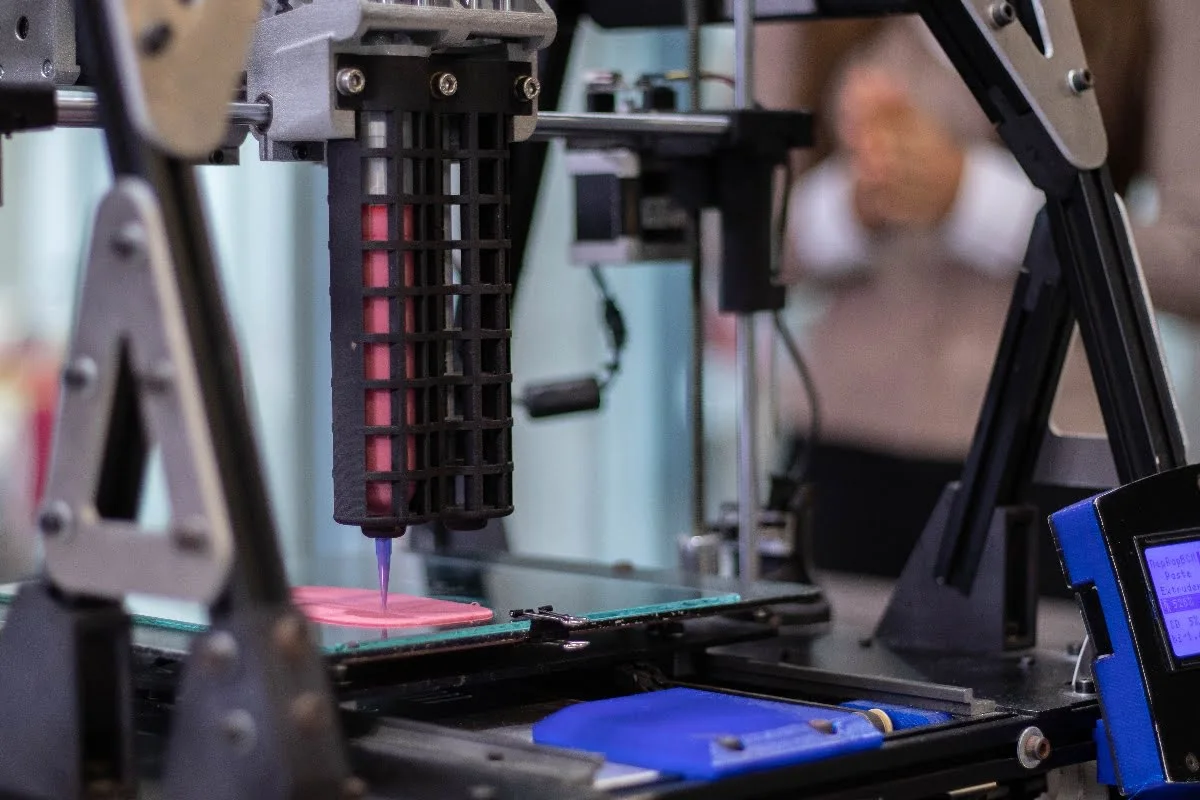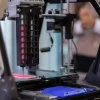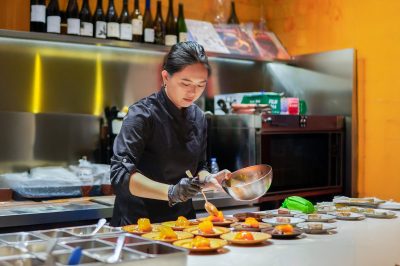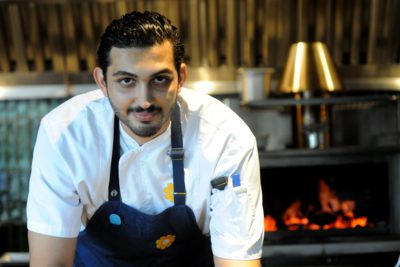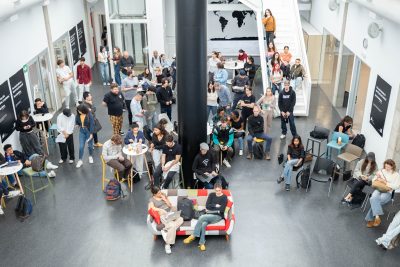On 2 March we held our CIBTalks to discuss the following topics FoodTech by leading experts in this field. The conference was moderated by Patricia Jurado, consultant specialising in food and science, with a degree in Science&Cooking from Harvard University. We had presentations from specialists in the field of artificial intelligence and robotics, nutrition, consultancy and communication. In addition, at the end of the presentations, the students carried out an exercise in which they designed possible scenarios for the future of food.
As an educational centre, one of our main focuses is to provide our students with the resources to anticipate and prepare for the changes ahead. Our greatest aspiration is to help them develop the skills necessary to play a leading role in gastronomy and to build their own culinary identity.
The power of IA technology in food
John Hutt, Head of Culinary Engineering de Remy Robotics opened the day to explain the evolution of food technology. Remy Robotics works on sustainable and efficient solutions in the food industry through robots. Robots have only recently entered the foodservice and food industry, but technology and the evolution of the food system have always gone hand in hand, creating new opportunities for the sector and for consumers. John took us through the role of technology throughout the history of gastronomy, how it has helped to shape our diets and the way we eat and, with it, our evolution as humans.
According to John, the coming years will see further consolidation of artificial intelligence that will exponentially change our food system.
How will our culinary experiences change when AI writes the recipes? Can a robot cook as well as a chef? Undoubtedly, the irruption of this technology will mark a before and after in the gastronomic sector, but it is still difficult to gauge how far it can go.
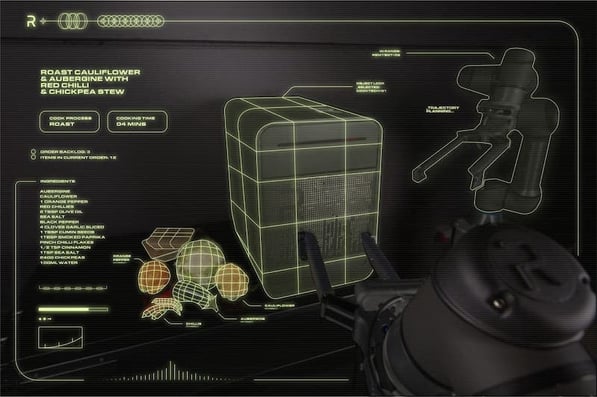
Source: Remy Robotics
Nutrigenomics and personalised nutrition
Andrea Frontons, CEO of Tailoryou along with the rest of his team, took over the presentation to explain their project. Tailoryou is a company formed by experts in nutrition and genetics, specializing in personalized nutrition. They carry out nutrigenetic studies to develop solutions based on epigenetic factors that connect habits with DNA.They analyse DNA through a sample of oral mucosa, and through the genetic profile they are able to design personalized dietary recommendations and guidelines based on how the body responds to certain nutrients and exercise.
During the talk we discovered what a genetic diet is, how it works, its benefits and its relationship with the food of the future. Epigenetic factors are key to the prevention of diseases and pathologies, and they can also help us to redesign our bodies (beauty and diet) and modify our dietary decisions. If we know them, we could design menus based on the genetic profile of individuals. Can you imagine being able to design a menu based on the amount of vitamins and minerals in the dishes?
Personalized food is getting closer and closer, and together with new technologies they are going to give way to a new way of eating and understanding nutrition. Personalized diets, which use DNA to create individual menus tailored to each person, are a big trend in the FoodTech industry and could be a solution to one of the biggest problems in our current system: malnutrition. An issue that costs $13.6 trillion annually.
Trends in the FoodTech sector and disruptive innovation in the sector
Beatriz Romanos, founder, and director of Tech Food Magazine, arrived just in time from Madrid to put the finishing touch to the presentations. Tech Food Magazine’s mission is to bring companies, startups and organizations, information and updated analysis on innovation and FoodTech. It has become a benchmark resource that contributes to discovering new ideas to give rise to innovative projects, doing a great job of dissemination. Within the tendencias FoodTech, Beatriz makes special mention of the Agrifoodtech sector, which has demonstrated its great potential in the last year, breaking global investment records.
“We are closer than ever to creating moonshot technologies to grow affordable, nutritious food for billions of people without devastating natural resources”.
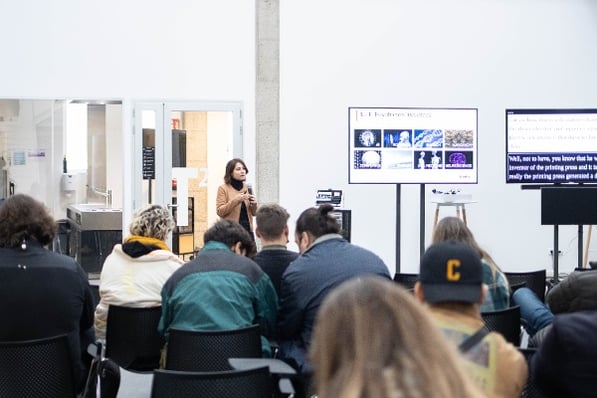
CIB students at CIBtalk Future conference
Thinking and designing future scenarios
After reflecting on how technology is changing the way we feed ourselves, it was time for our CIBers to put into practice everything they had learnt together with their creativity and the knowledge they had acquired during the course.
The activity consisted of debating and reflecting on how we will cook, buy or eat in 2050 and finally presenting a proposal as a team. The ideas circulated around the CIB atrium, concepts such as plant-based, 3D printing of vegetable meat, delivery service with drones, metaverse, AI in restaurants or food waste. How many of these ideas are science fiction, and which ones are already a reality?
Undoubtedly, there is still much to be developed in the FoodTech industry, but we can affirm that we are in a scenario in which the future of food is a challenge that we will probably have to face with the help of technology.
By 2050, the earth is expected to be inhabited by 10 billion humans, which is a real challenge for our species. Being agents of change, adapting to new realities, designing and supporting a transition towards more sustainable models is also the responsibility of the future chefs.
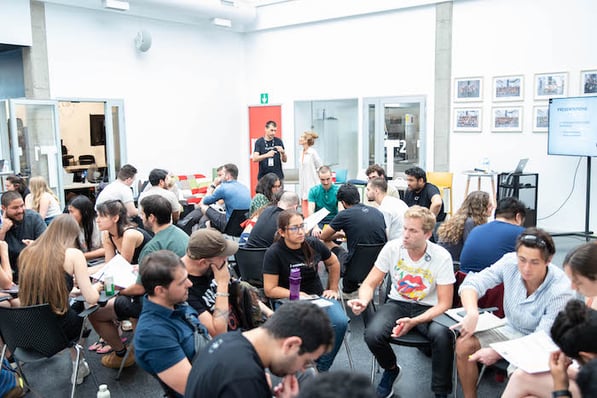
Workshop FoodTech

